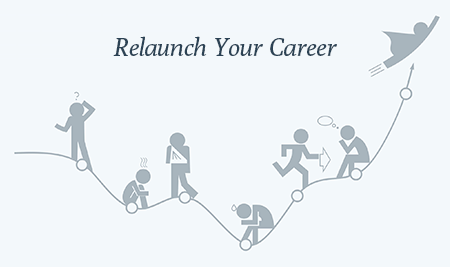As far back as I can remember, I’ve always aspired to have a “successful” professional career. For many years, that meant holding down a full-time job at a reputable organization with a stable salary and credible job title.
On top of that, I’m actually a risk averse person. I don’t like uncertainty. I don’t like jumping into situations where I don’t know how things will turn out. I prefer having a plan. Every time I’ve taken the Myers-Briggs test as the part of any group or corporate team-building exercise, I consistently scored as the extreme “planner” on the team. Also, conventional career wisdom suggests you’re more employable to a future employer if you’re currently employed.
So the idea of taking a break from my career without any clear idea of what I would do next has always been unsettling, especially to someone like me.
Professional breaks always used to make me nervous. The kinds where you don’t have a job. Where you have a gap in your work history. Or where you’re not exactly doing something that nicely fits into the career history section of your resume.
However, during those instances in my life when I have stepped off the beaten path, when I’ve given myself permission to momentarily step away from corporate ladder-climbing or resume building, I’ve always ended up accelerating my career in a more fulfilling direction, one more in line with who I am and what I want for my life.
I’ve learned a few things along the way. Things I wish I had known prior to taking these breaks. It turns out these times of unstructured Reflection (the 6th stage in the 7 Stages of Career Change) are not only useful, but often necessary when you’re trying to relaunch your career.
Lesson 1: Career reinvention requires space

During the major pivot points in my career, I often found myself trying to straddle the line between my established past and my desired future. I’ve always believed that if you want to make progress, you have to behave like the person you want to become, not the person you have been.
The problem is, it’s hard to do this when you’re trying to balance your day job with your other interests. You only have so much energy. You only have so many hours in the day. And you only have so much headspace. When you’re trying to meet work deadlines, deliver on projects, and keep your teams happy, it can be hard to truly devote yourself to pursuing side projects.
Simultaneously having your feet on two separate boats is hard. At some point, you have to make a clean break. You have to give yourself permission to let go of one career to make room for the pursuit of something else.
You have to balance what you want and where you’re going with what is & what has been. –President Barack Obama
WTF with Marc Maron, Ep 613
Lesson 2: Taking a break is okay

I’ve always felt little bit guilty about taking a break. Ever since having a collapsed lung in high school, I’ve felt this deep sense of life’s fragility. My way of responding to that has always been to fill my time doing something “productive.”
The problem with this attitude is that I don’t always allow myself to take breaks. My good friend Hitesh, during our college days at Northwestern, gifted me the book, The Art of Doing Nothing. He wrote a note on the inside cover telling me that in all the years he had known me, he had never seen me just sit still and be idle. This part of me simply hasn’t changed after all these years.
For example, after I finished my MBA, I decided to take a brand management role at Clorox. Upon graduation, I was very eager to start. However, one of my mentors there, Mike Wolfe, encouraged me to take my time. He said I may never have an opportunity to take this amount of time off with a job lined up. I took his advice, and instead of starting that May, started as the last incoming brand manager in my cohort that September.
I instead opted to spend those summer months traveling through Europe, spending time with my girlfriend (now wife) in the UK, reconnecting with long-lost friends and family, and relaxing after an intense two years in business school.
In spite of my initial nervousness in doing it, those few months I took off did not hurt me professionally in any way. In fact, with my renewed energy, I was able to devote 100% of myself to my role once I did start, and was later on track to be one of the first brand managers in my cohort up for promotion.
Not giving yourself space to take breaks can prevent you from realizing the unique benefits that only come when you step away from your career journey. It’s okay to take a breather sometimes. Your career will be a long one.
Lesson 3: My career is only a part of who I am

I’ve caught myself falling in the trap of defining who I am based on what I do. I used to introduce myself by my job title. Working for a big name company or organization certainly simplifies the process of defining who you are to other people. If this wasn’t the case, the infamous question “What do you do?” wouldn’t exist.
It turns out the transitional moments of my career–when I was between jobs, or when I was just trying to figure stuff out—often ended up being the most personally gratifying. After college, instead of charging toward my presumed path of medical school, I instead took one year in Honolulu Hawaii to explore a range of my personal interests including business, radio journalism, salsa dancing, and teaching. After I left the corporate world to start my own business, I took a full 2 months off to reconnect with good friends and family around the world, which helped reground me for the venture ahead.
Taking a career break allows you to feed the other parts of yourself. Your personal interest, your passions, your relationships, or anything else that makes you you. Most importantly, reconnecting with these other aspects of your life can help remind you what matters and what’s truly important to you.
Lesson 4: Going backwards is very tempting

Every time I’ve finally made the leap to pursue another career path, I always caught myself feeling tempted to go back to what I was doing before. After I made the decision to quit medical school, in the absence of knowing what else to do, I found myself going through the motions of applying to other medical schools. When I left the corporate marketing job to launch my own business, I wasn’t exactly raking in the clients on day one. When marketing recruiters called me up for jobs, I definitely found myself doing a double take. This in spite of the fact I’d just decided these roles were no longer right for me!
Bizarre behavior, I realize.
The natural temptation is to fill a professional void with something you already know. For lack of a better comparison, It’s a little bit like a rebound relationship. You break up with someone, then if you don’t meet someone else, you naturally start to wonder if a) that person was as good as it gets or b) you made some sort of a mistake or c) you may never figure out what you really want, so what difference does it make anyway?
Maintaining your faith and forward progress during these transitional times is not easy. You will find yourself being tested. But you have to remind yourself that you left to move on. That the whole reason why you’re in a transition is because you want to pursue something new.
Lesson 5: Game-changing ideas can from from anyone

My first job after college was a three-month internship at Northwestern Mutual Financial. Each morning, I took the same bus to work. I got on at the first bus stop, where I found the same bus driver there each morning, reading the morning paper. His name was Iama, a former fire dancer turned bus driver. He knew I loved the news, so once it was time for him to drive, he would hand me the newspaper, I would read it during the journey, and we would chat about current events.
One morning, as my internship was wrapping up, I was talking with him about what I should do next. He asked me if I ever considered being a news anchor. He said I had a decent voice, and I always seemed to have a passion for the news. It had never occurred to me to do this professionally. But he planted the seed. A couple months later, I landed an on-air gig as the afternoon news anchor for National Public Radio’s affiliate in Honolulu. And years later, I’m now gearing up to launch my own podcast.
Another example. After leading medical school, I had no idea what to do with my life. For two solid years, I was utterly confused about where to go. I ended up seeing a therapist on a weekly basis in Washington DC. Her name was Dr. Lori Lefcourt, and she was the first person who told me that whenever I talk about medicine, I looked really unhappy but whenever I talk about business, I seemed super energized. That was the first moment I seriously begin to think about a career in business, which I eventually pursued.
The point is that fresh perspectives can be invaluable. Advice, if you’re open to receiving it, can literally change your life. I’ve found the most influential, pivotal ideas have always shown up during times in my life when I wasn’t preoccupied or overwhelmed with work. I’m not sure why this happens. Maybe it’s because I let my guard down a little bit during these times. But it’s most likely because I’m just more open to asking for directions when I’m 100% certain I’m lost.
The power of taking a professional break

I know giving yourself permission to take a break from work is not always easy. I know how unsettling it can feel to not have a neatly packaged response to the question, “What do you do?” especially when you’re not working. As someone who has interviewed many job candidates for roles, I know having a seamless career history can instill confidence in hiring managers.
However, taking a break from work gives you space. Space provides opportunities for important personal reflection. Space allows you to pursue other interests. Space allows you to reinvent who you are what you stand for. Space gives you breathing room to move forward instead of clinging on to the past. And space allows you to open yourself up to other perspectives that can literally change your life.
If you’re feeling a bit suffocated, burnt out, or confused about where to take your career next, giving yourself permission to slow down can help you reflect, recalibrate, and eventually relaunch yourself toward your next career frontier.
Next Steps: Clarify Who You Are & What You Want
If you’re in a reflective stage of your career, and you want to further clarify your personal brand, your life purpose, or values, to help inform the next stage of your career, I’ve got a little treat for you. I’ve got a couple guided audio recordings that can help you clarify what matters to you. I’ve done these exercises myself, and I found them surprisingly useful, so I decided to narrate & record the scripts so you can try them too. Be warned, they’re very different exercises from the worksheets & templates I typically share with you 😉
Listen to Recording on Clarifying Your Life Purpose
Available exclusively to Resource Hub Members!
You can also access the Career Change & Personal Branding Resource Hub for other helpful exercises to help you navigate whatever stage you’re at.
Your thoughts?
Have you ever taken a momentary break from your career? What did you learn? You can comment below or even leave me a voice message. I’d love to hear from you!




Great list. Thanks for sharing!
I just recently took big strides to overcome the temptation to go backwards.
For me the temptation was fueled by too closely relating my identity and self-worth to working full-time while also struggling with a scarcity mind-set.
When I say scarcity mind-set, it was almost like a little voice was telling me that at any moment something would happen to obliterate my saving and I wouldn’t be able to make ends meet.
I recently left a base-plus sales position. Being risk averse like you Joseph, I managed to parley that old position to an independent sales rep (commission only) arrangement in which I could continue to serve the same clientele while also pursuing other opportunities.
This arrangement offers me a pretty good income for the foreseeable future. I have checks due to me already and a healthy pipeline of new deals pending deals. However, I could go a month or two without a check so I have to be disciplined with my spending in the meantime.
For a while now, I’ve been working a plan to break into a new line of work while maintaining my full-time job. I have definitely been making progress towards that full transition, but that progress has been slow.
Now that I’ve left that full-time job I have a lot more time to dedicate to working my plan for career change. I’m no longer locked into mandatory +8 hour work days.
Of course, I didn’t see it that way at first.
For the first few weeks of being more-or-less self-employed I was sitting for interviews and trying to land another base-plus sales job. The goal was to be able to pull a minimum income while continuing to work on my long-term plan for career transition.
The truth is that I have a healthy savings, I’m not in debt, and I have money on the way. Put another way, I’ll get by even if I start to dedicate more time on my transition rather than activities that will directly impact this year’s short-term income.
I have no reason to be taking time away from my clients and from working my transition plan to land another base-plus sales job; my scarcity mind-set was unjustified.
What really set me over the edge to ditch my scarcity mind-set, stop looking for another job, and focus on the opportunities before me was an interview Jesse Elder gave on Geoff Woods’ podcast.
The episode is titled Making Uncomfortable Goals Your New Normal.
[You can listen to it here: http://geoffwoods.com/82-making-uncomfortable-goals-your-new-normal-with-jesse-elder/ ]
That conversation between Geoff and Jesse challenged me to define my circumstances as opportunity to be resourceful, instead of wasteful.
There is definitely a time limit on this opportunity. That’s why it’s so important that I be focused and intentional with how I use my effort.
I guess what I’m saying is that I’m living your list of lessons right now.
I’m taking my space for reinvention because I’ve finally given myself permission to do so. I am allowing myself to work part-time because having a full-time job is not my identity and neither is scarcity. I’ve overcome the temptation to go backwards because my game changing idea struck me though the stereo speakers of my car.
I didn’t think I could be more fired up for this season of my life but, your article dumped gasoline on that fire.
Thanks Joseph!
– Brendan Alan Barrett
Brendan,
Thanks so much for sharing your personal story with us, and pointing out a few of the challenges we all struggle with whenever we step away from our usual day jobs: the scarcity mindset, not knowing where the next paycheck will come from, and trying to figure out how to define yourself after you no longer have a fancy job title.
I definitely know what you mean about the scarcity mindset. I actually struggle with that myself quite a bit. I have this sort of productive (hopefully) paranoia, where I always feel like I could lose all my clients, or my business will dry up, Or the ideas I’m working on will not really amount to anything. We can definitely be our own toughest critics 🙂
I’m happy to hear you had your “ah-ha” moment. The great news is, it sounds like you have taking a great step to create some space in your life to pursue this with 100% focus, which is a great start. I hope it all goes well for you.
Thanks for sharing that podcast episode also. I’ll have to check it out! Look forward to any other thoughts you wish to share in the future. It’s great to have a voice like yours as part of this this community.